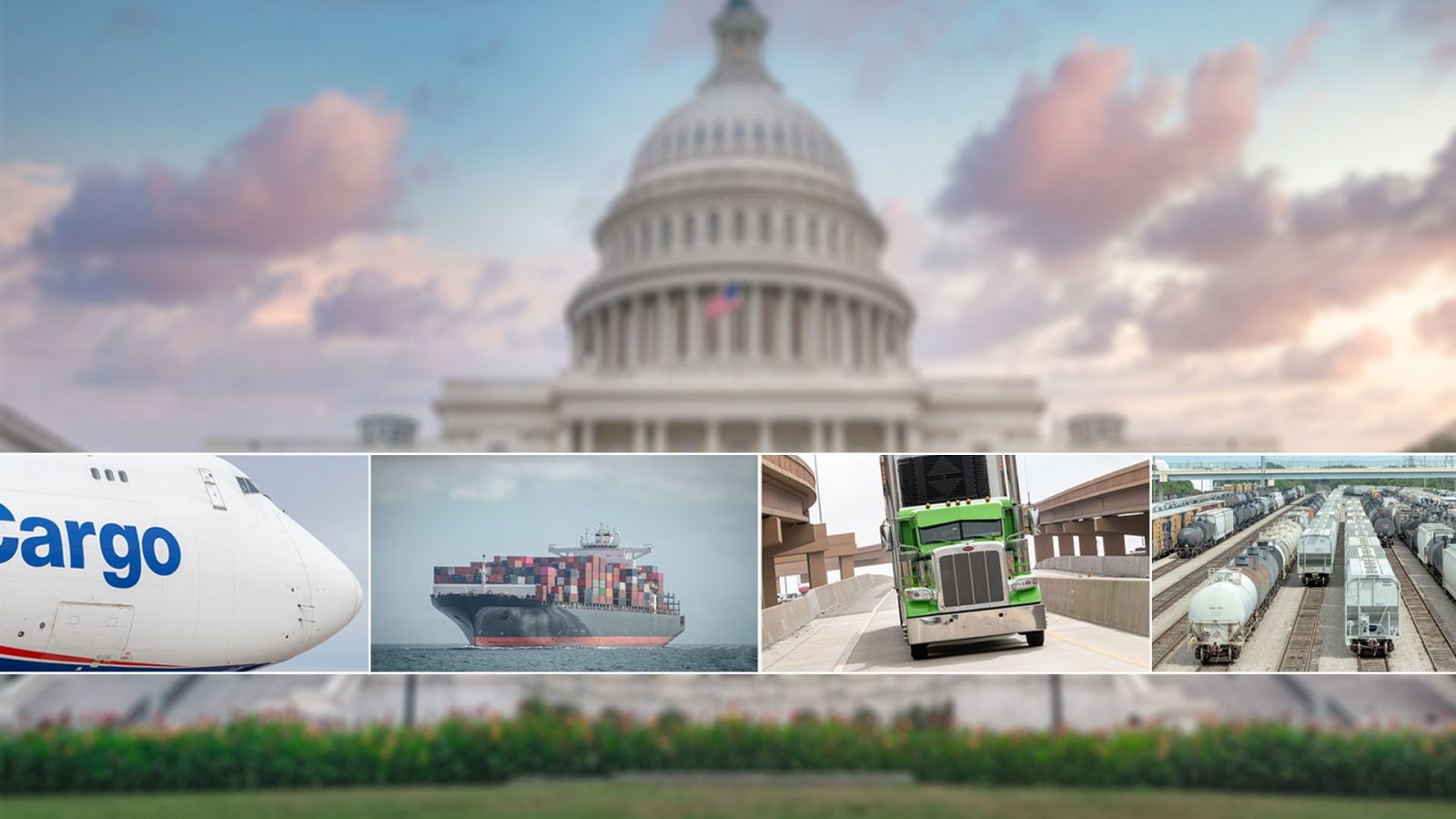 Congress is taking on freight markets in 10 big ways. (Photo: Shutterstock & Jim / )
Congress is taking on freight markets in 10 big ways. (Photo: Shutterstock & Jim / )
Freight supply chains have never been more at the front of the average consumer’s mind than the past two years, and House and Senate lawmakers on both sides of the aisle have been responding with proposals that affect all modes.
But given the close connections being made between goods movement, the economy and consumers’ wallets, these 10 bills may have a fighting chance.
Ocean Shipping Reform Act of /2022
House: H.R. /Senate: S. 3580
Co-sponsors: House bill: 96 (48 Democrats, 48 Republicans); Senate bill: 27 (13 /14 Republicans)
Status: House bill: Passed on Dec. 8, 2021. Senate bill: Introduced on Feb. 3, referred to committee.
Mode affected: Ocean shipping.
Summary: Both bills would shift the burden of proof for ensuring accurate and reasonable demurrage and detention charges from the party being billed — shippers, truckers and others — onto ocean carriers. Both bills are aimed at promoting U.S. exports, with the House bill implementing stronger provisions to help ensure export cargo is not unreasonably declined by carriers.
Truck Parking Safety Improvement Act
H.R. 2187
Co-sponsors: 28 (11 Democrats, 17 Republicans)
Status: Introduced March 29, 2021, referred to committee.
Mode affected: Trucking.
Summary: The bill would authorize the U.S. Department of Transportation to provide parking on federal highways for commercial trucks.
Facilitating Relief for Efficient Intermodal Gateways to Handle Transportation (FREIGHT) Act
S. 3262
Co-sponsors: six Republicans.
Status: Introduced on Nov. 18, 2021, referred to committee.
Modes affected: Ocean shipping, intermodal rail and trucking.
Summary: Address ongoing freight challenges while putting in place policies to support the transportation network in the long term.
Why it matters: A flurry of Republican bills were introduced late last year ostensibly to address short-term supply chain disruptions, but most were seen as holiday-season protests against an alleged lack of action by the Biden administration to deal with freight bottlenecks. The FREIGHT Act attempts to move beyond the short term by including provisions that its sponsors believe can address more systemic problems, particularly at U.S. ports. Its main provision would establish a grant program for port authorities aimed at standardizing terms and documents used in port operations to improve the ability of marine terminals to notify shippers, railroads and truck drayage companies when cargo is available for transfer.
Customs-Trade Partnership Against Terrorism (C-TPAT) Pilot Program Act
House: H.R. /Senate S. 2322
Co-sponsors: House bill: three (one Democrat, two Republicans). Senate bill: five (three Democrats, two Republicans)
Status: The House bill passed out of the Homeland Security committee on March 2. The Senate bill passed the Homeland Security and Governmental Affairs committee.
Modes affected: Ocean shipping, rail, trucking and airfreight.
Summary: Creates a pilot program for 10 DOT-licensed property brokers and 10 warehouse entities to be C-TPAT certified.
Why it matters: The C-TPAT program is a government-industry partnership created in the aftermath of 9/11 to expedite freight through the country and reduce disruptions of international supply chains while keeping the border secure. However, it excluded non-asset-based 3PLs from participating, which they contend puts them at a competitive disadvantage. These bills — which passed their respective committees with strong bipartisan support — would help 3PLs and freight brokers grow their businesses by putting them on more equal footing with asset-based competition.
Hydrogen for Ports Act of 2021
S. 3111
Co-sponsors: six (four Democrats, two Republicans)
Status: Introduced on Oct. 28, 2021, referred to committee.
Mode affected: Ocean shipping.
Summary: Requires the secretary of Energy to establish a grant program to support hydrogen-fueled equipment at ports and to conduct a study with the secretary of Transportation and the secretary of Homeland Security on the feasibility and safety of using hydrogen-derived fuels, including ammonia, as a shipping fuel.
Coast Guard Authorization Act of 2022
H.R. 6865
Co-sponsors: three (one Democrat, two Republicans)
Status: Introduced on Feb. 28, amended and reported out of committee on March 3.
Mode affected: Ocean shipping.
Summary: Authorizes appropriations for the Coast Guard and other purposes.
Ocean Shipping Antitrust Enforcement Act
H.R. 6864
Co-sponsors: eight (six Democrats, two Republicans)
Status: Introduced March 1, referred to two committees.
Mode affected: Ocean shipping.
Summary: A bill to amend Title 46, United States Code, to repeal certain antitrust exemptions for ocean common carriers.
America Creating Opportunities for Manufacturing, Pre-Eminence in Technology, and Economic Strength Act of 2022 (America COMPETES Act of 2022)
H.R. 4521
Co-sponsors: 101 (100 Democrats, one Republican)
Status: Passed the House on Feb. 4.
Mode affected: Rail.
Summary: Legislation aimed at tackling supply chain vulnerabilities with the goal of making more goods in the U.S.
Supporting Trucking Efficiency and Emission Reductions (STEER) Act
H.R. 4810
Co-sponsors: seven (one Democrat, six Republicans)
Status: Introduced on July 29, 2021, and referred to committee.
Mode affected: Trucking.
Summary: Establishes a voucher program for purchasing and installing fuel-efficient and emission-reducing technologies for Class 8 trucks.
Port Crane Security and Inspection Act of 2022 and Port Cranes for America Act
H.R. /H.R. 6488
Co-sponsors: Zero.
Status: Introduced on Jan. 25, referred to committee.
Mode affected: Ocean shipping.
Summary: Partner bills targeting cranes manufactured in China.





